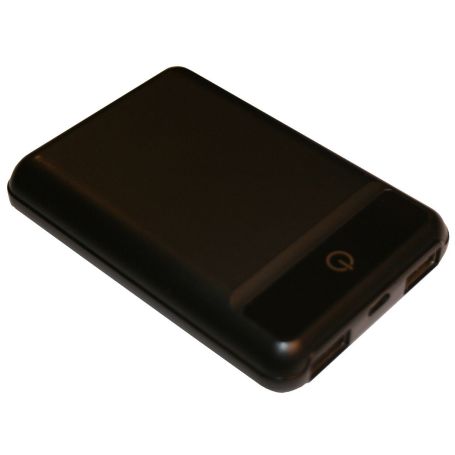[RETIRE] PowerBank / LiPoly battery - USB - 10000 mAh - 5v
[RETIRE] Un PowerBank, accumulateur LiPoly - USB
- Rechargeable USB
- 10.000mAh
- 2x 5V USB-A @ 2.1A
- Total Max 2.4A
- 200 gr
Payments are secured by LyraCollect, a French payment collection company.
It is possible to delivered to your home, to a pick-up point or picked up by appointment at MCHobby
We prepare, pack and ship your orders with great respect and care.
A 10.000mAh / 10Ah powerbank taillored for DIY applications
Here's a rechargeable battery with massive capacity for your Raspberry Pi or Raspberry Pi B PLUS projects, Arduino, or anything else that runs on 5V! This battery is designed to provide plenty of power to an iPhone, mobile, tablet, etc. but we have noticed that it also does an excellent job when it comes to powering a miniature computer and/or microcontrollers.
Inside the case, there is a 5000mAh lithium polymer battery, a charging circuit (you can charge it using the included USB cable) and two powerful converters capable of delivering a total of 2.4 amps to the USB ports. It is a key element to support the load of a Raspberry since it consumes 700mA to 2.0A depending on the Raspberry-Pi model and the load.
With such a battery, it should be possible to connect a 2.5" display (powered from the 5V pin of the Pi), a wireless keyboard/mouse and a WiFi key. Enough to make a completely portable nanocomputer!
The "survival" time before shutdown of the accumulator depends on what you are going to connect to it and the powers it requires.
There are 4 LEDs indicating the discharge level and the on/off button.
Smart Powerbank and low power project
Like many chargers/PowerBanks, this model is said to be a "smart powerbank". This means that it goes into standby if the consumption is non-existent or too low.
IF you do operates a microcontroller, or nano-computer, consuming little power THEN you can use a "PowerBank-Foolish" project/board simulating a dummy load from time to time to prevent the PowerBank from going to sleep.
Content
- The powerbank / Lipolu batterybattery
- A USB cable A -> Micro B
Typically used to recharge your battery on a PC.
Recharging the PowerBank
This battery has an Intelligent Circuit to detect the power of charging. Connected to a computer, it will charge at 500mA (the maximum allowed on a USB port).
On a 1000mA USB power supply (like the one we offer for Raspberry), the charge will be 1000mA.
The battery will refuse to charge if the charging voltage is below 5V or if the charging current is less than 500mA.
Charging before first use:
Fully charge your battery before using it the first time.
Charge time:
If your battery is fully discharged, it will have to be recharged up to 5000mAh. On a standard PC USB port limited to 500mA, it will take 5000mAh/500mA = 10 hours of charging.
If your battery is discharged at 50%, it will be necessary to recharge the 50% missing, is 50% of 5000mAh = 2500mAh. If you use a plug-in charger capable of supplying a 1000mA current, you will need 2500mAh/1000mA = 2.5 hours = 2 hours and 30 minutes of charging.
Do not recharge this battery from a Raspberry Pi (see details below)
Recommendation for Lithium Ion/Lithium Polymer battery
This type of battery is extremely powerful and capable of storing huge energy. These exceptional characteristics are also accompanied by a disadvantage: warming up.
To control this disadvantage, the battery is equipped with an intelligent energy manager.
Nevertheless, if the battery is technically "abused", or if it is damaged physically or electrically, it can then heat up quite hard in case of high-speed charging/discharging. That's why these batteries use intelligent charge/discharge circuits... and short-circuit protection. Despite this protection, be careful not to create a short-circuit.
It is recommended not to recharge a Lipo battery on clothing (cfr Flora range) or near potentially flammable material. Even if all the protections are taken by the different manufacturers, the latter always advise to recharge Lipo, Li-Ion batteries under surveillance.
If the battery case is open or damaged, it is important to take special measures (inspection, re-packaging, stop using).
Here is a video showing what can happen to a Lipo battery when it is overloaded (in this video the destruction was the target result and the battery was thus "abused" to reach this end... it does not remain less interesting)
The battery and Raspberry-Pi
This battery has been selected to power a Raspberry-Pi to turn your Pi into a portable project.
Contrariwise, do not use your Raspberry to try to recharge this battery. The MAX current of a USB port of Raspberry is 140mA... while the battery requires 500mA minimum to recharge.
So do not try to recharge your battery from your Pi, you can damage your Pi.







